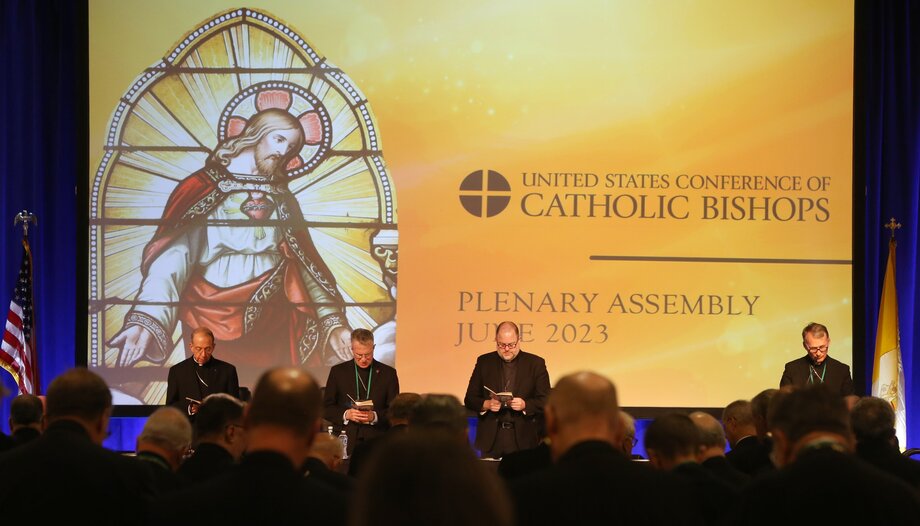On Wednesday, June 14, the spring meeting of the United States Conference of Bishops (USCCB) began in Orlando, Florida.USCCBThe three-day meeting will be held in Rome.) Over the course of three days, the prelates will discuss issues relevant to the future of the Church in the coming years, among them: the "Church of Jesus Christ" initiative.National Eucharistic Revival"(2022-2025); the National Eucharistic Congress in 2024; a new national pastoral plan for Hispanic ministry; the USCCB's strategic plan priorities for the period 2025-2028 and a plan for the ongoing formation of priests.
Although the meeting began on June 14, a day dedicated to prayer and fellowship among the bishops, the formal work and sessions began on Thursday, June 15. Christophe Pierre, Apostolic Nuncio of the USA, gave the opening address, followed by Bishop Timothy P. Broglio, President of the USCCB. Where are we on the synodal journey and where are we going as a church in the USA? were the questions that guided the Nuncio's message. The synodal path, he said, is not a program but a way of being of the Church and therefore can be a challenge.
Today we arrive at our destination using the GPS, however, "for our spiritual navigation in the synod, we do not need a GPS but a compass, for it shows us the north. As Church we know the direction we are going: Jesus Christ and his Kingdom are the true north. But to find the right way, we have to immerse ourselves in the reality of our people and listen attentively to the questions and concerns of their hearts. This is the synodal way, the incarnated way of Jesus," said Bishop Pierre.
Orientations for the synodal journey
The Nuncio offered three orientations to better understand the synodal journey that the Holy Father calls us to adopt: encounter, listening and Eucharistic rebirth in order to contribute to a synodal evangelization. On the first aspect, the Nuncio emphasized the need to be a missionary Church, that is, one that goes beyond ecclesial structures to meet those who do not know the presence and love of Christ: "The Church is a dynamic reality. It is always on the move. Like Christ, we must go on mission to the world in a spirit of openness," he said.
This brings us to the second guideline, he specified: listening with the objective of uniting. "It is infuriating to see the division that exists in society and in politics. These divisions impede progress by affecting the most vulnerable. But the same kind of polarization also infects us within the Church," he emphasized.
Eucharist
Finally, Bishop Pierre extended the invitation to live the Eucharist as a mission, especially in this second year of the Eucharistic Renaissance: "The Eucharist is the real presence of Christ. It is a dynamic sacrament, which imbues everything we do with the character of Christ's love for his people. It is a sacrament for mission. Therefore, a Eucharistic rebirth is a call to make the totality of our lives an expression of the Lord's presence among us," the Nuncio said.
Timothy P. Broglio, Archbishop of the Archdiocese for the Military Services and president of the USCCB noted that it is encouraging to see the Eucharistic Revival initiative moving forward: "This effort is certainly about proclaiming the truth about the mystery of the Eucharist and the real presence of our Lord and Savior. We want to reinforce the fact that our participation in the Mass is our participation in the saving act of Jesus Christ on Calvary," Broglio said.
Migration
The USCCB Chairman also spoke about migration. "The U.S. continues to look for ways to address the challenges of immigration. We cannot fail to see the face of Christ in all who need our help, especially the poor and vulnerable. I imagine many of us have ancestors who, either recently or at least in the 19th century, came to these shores seeking a better life. Even those who arrived on the Mayflower were seeking freedom from religion and a new life," he said.
In this regard, he pointed out that the Catholic Church is committed to the common good and stressed the willingness to cooperate with government institutions and other religious entities to help in the immigration issue. "I know that this may confront us with certain groups or people who fear immigration, but our commitment is to the truth about the human condition and the dignity of each person, from conception to natural death," he said.
The USCCB president also spoke about the situation in Ukraine and of his visit to the region: "From December 27 to 31 I visited Lviv, Kiev, Bucha and Irpin. I was surprised by the devastation and also by the resilience of the people. There were times when I had to spend time underground, during the bombardments and threats," he emphasized. Broglio also referred to the continental synodal process in which he participated with Canada: "It was a time of discernment, listening and openness to the Holy Spirit," he said.
The USCCB spring conference will conclude on Friday, June 16.









